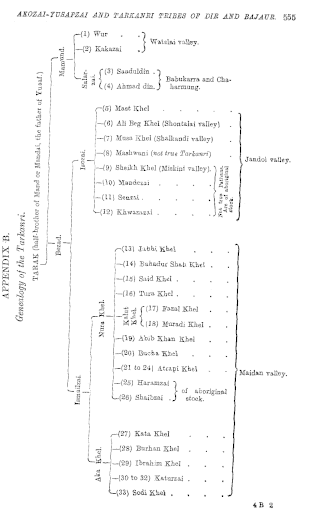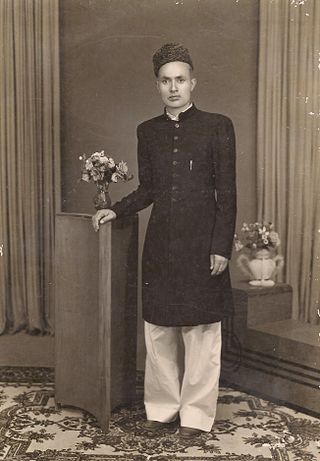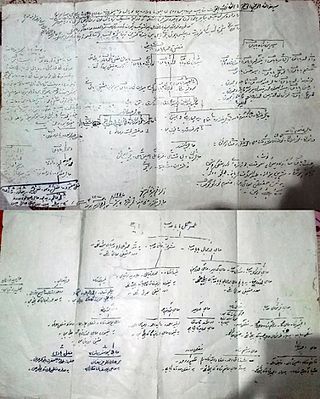The Yusufzai or Yousafzai, also referred to as the Esapzai, or Yusufzai Afghans historically, are one of the largest tribes of ethnic Pashtuns. They are natively based in the northern part of Khyber Pakhtunkhwa, to which they migrated from Kabul during the 16th century, but they are also present in smaller numbers in parts of Afghanistan, including Kunar, Kabul, Kandahar and Farah. Outside of these countries, they can be found in Ghoriwala District Bannu, Balochistan Sibi (Akazai), Chagai (Hassanzai) and Rohilkandh.

The Bangash, Bungish, Bangaš or Bangakh are a tribe of Pashtuns, inhabiting their traditional homeland, the Bangash territory which stretches from Kohat to Tall in Hangu and Spīn Ghar kurram in Khyber Pakhtunkhwa, Pakistan. They also live as a smaller population in Dera Ismail Khel, Bannu while also a smaller population of Bangash inhabit Gardez, Paktia, Afghanistan.
The Marwat is a Pashtun tribe, a branch of the Lohani tribe and belong to Lodi section. The Marwats were named for their ancestor Marwat Khan Lodi.
The Tareen is a Pashtun tribe inhabiting southern Afghanistan, and western region of Pakistan.

Lakki Marwat or Lakki is the headquarters of Lakki Marwat District in Khyber Pakhtunkhwa province of Pakistan. Lakki Marwat has become one of the fastest growing cities in Khyber Pakhtunkhwa. Lakki Marwat is also the 20th most populous city in the province of Khyber Pakhtunkhwa.

Bannu also called Bana and Bani is a city located on the Kurram River in southern Khyber Pakhtunkhwa, Pakistan. It is the capital of Bannu Division. Bannu's residents are primarily members of the Banuchi tribe and speak Banuchi (Baniswola), a dialect of Pashto which is similar to the distinct Waziristani dialect. The residents regardless of their tribes are commonly called Banusi, Banuchi or Banisi.

The Mullagori or Mulagori or Malagori is a Pashtun tribe present in Khyber District, tribal areas in Khyber Pakhtunkhwa, Pakistan. Historically, they are one of the smallest tribes of ethnic Pashtuns. They are considered as a sub-tribe of Momand Pashtun Ghoryakhel confederacy.

Ghoriwala also called Ghariwola is a town and union council in Bannu District of Khyber-Pakhtunkhwa. Its history and name is sometimes linked with the famous Muslim King Sultan Muhammad Ghori. The area is mostly inhabited by Mughal Khel branch of Yousafzai Pashtuns.
Aba Khel is the subtribe of Mandanr Yusafzai Pashtun tribe in( Swabi District of Khyber Pakhtunkhwa of Pakistan. They are settled in villages Zaida, Kaddi, Hund, Shah Mansur, Khunda, Ambar, Panj Pir, Beka, Aryan, Lahor and Kheshgi Nowshera kalan .and village Ragastoon swat Khyber Pakhtunkhwa Pakistan.

The Kakazai, also known as Loi, Loe, or Loye Mamund, a division of the Mamund clan, are a Pashtun tribe part of the larger Tarkani tribe who are primarily settled in Bajaur Agency, Pakistan, but originally hailed from the Laghman province of Afghanistan. However, it has grown and scattered around to such an extent that it is recognized as tribe of its own.
Naikpikhel is a sub-clan of the Yousafzai Pashtun tribe in Swat, residing in the surrounding area of Tehsil Kabal, Swat, situated just opposite to Mingora on the western bank of the River Swat in Swat District, Khyber Pakhtunkhwa, Pakistan.

Khan Roshan Khan Yousafzai was a Pashtun historian, educationalist, and writer from Pakistan known primarily for being president of the Muslim League in Swabi and for writing books on the history of the Pashtun people.

The Bannuzai(Shitak/Shitakzai) or Banusi, Banuchi, Banisi originally Shitak Afghans. are a Pashtun tribe which has the reputation of being one of the most warlike amongst the Afghan or Pashtun people. They inhabit the Bannu, Dera Ismail Khan, North Waziristan and Kurram of the Khyber Pakhtunkhwa province of Pakistan, with some members settled in Khost and Injil of Herat Afghanistan. Shitak was the name of their ancestor. Therefore, according to Afghan/Pashtun traditions, his descendants were called Shitak or Shitakzai, Zai means "son" in Pashto. However, it is more famous by its nicknames like Banuchi or Banusi and these people call themselves Banisi. These titles belonged to this tribe in relation to this region. Because the name of Bannu area comes from bin, which means forest. This area used to be a forest. In which shesham and mulberry trees were found in abundance. Later on, it has evolved from Bana to Bani and then Bannu over time. Even today, the local people and the people of the surrounding area call it Bana and Bani.
Gadezai is an administrative subdivision (tehsil) and Union council of Buner District in the Khyber Pakhtunkhwa province of Pakistan.

Babuzai is a Pashtun tribe. Babuzai is a subtribe of the Yousafzai tribe.

Khwajgan, also known as Khwaja Khel,(خواجه خېل) is a clan or family of Yusufzai Pashtuns Khwajgan settled in different parts of Swat valley Zhob District loralai District and Tank DistrictPakistan, i.e. in Bara Bandai, Mingora, Barikot, Charbagh and Dakorak. Khwajgan is the title for "the Masters" or "learned people". Khwajgan, as the plural for "Khwāja", is often used to refer to a network of Sufis in Central Asia from the 10th to the 16th century. In Firdowsi's Shahnama the word is used many times for some rulers and heroes of ancient Iran as well. Khwajgan or Khwaja Khel of Swat valley are those who follow Pashtunwali, a non-written ethical code.
Kot Qalandar is a town and union council in Bannu District of Khyber-Pakhtunkhwa. Its major principal tribe is Hakim Khel branch of Mughal Khel. Mughal Khel are Yousafzai Pashtuns settled in southern parts of District Bannu, with Ghoriwala as their principal center.
Khan Khel is a sub-tribe of the Yusufzai Pashtun tribe.

Bhangi Khan Mughal Khel is a village in District Bannu in north-western Pakistan. It is located in UC Ghoriwala.
Malak Ahmad Khan Yusufzai (1460–1530) also known as Malak Ahmad Baba was an Pashtun chief and warrior. He belonged to the Razar Mandanr clan of the Yousafzai. Ahmad Khan's life was spent in fighting and resettling the Yusufzai in modern Khyber Pakhtunkhwa, Pakistan. The Yusufzai fought the Dilazak, also known as the Swati for control of northern KPK. The Dilzaks had initially given refuge to the Yusufzai before they were driven out by them. After being expelled, Malak Ahmad Khan replaced his uncle Malak Suleiman Shah as the chief of the Yusufzai. Through Bibi Mubarika marriage to Babur, the Yusufzai finally made peace with the Mughals and were able to establish their stronghold in Dir, Swat, Buner, Malakand, Swabi and Mardan with Thana, Malakand as the capital. Bibi Mubarika was the daughter of Shah Mansur, who was the son of Malak Suleiman Shah and the cousin of Malak Ahmad Khan.











